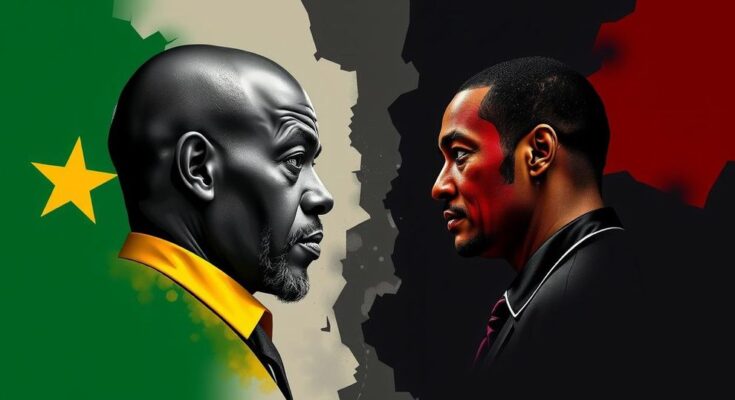Renewed fighting in eastern Democratic Republic of Congo has ignited concerns from the Angolan government as violence resumed in Kalembe. Following successful peace negotiations, the conflict now jeopardizes ongoing peace efforts and exacerbates the humanitarian crisis. Angola condemned the clashes, calling for adherence to ceasefire agreements, while mediating talks between the DRC and Rwanda continue in search of a lasting resolution.
Renewed clashes in eastern Democratic Republic of Congo have invoked grave concerns from the Angolan government, particularly following a recent campaign for a prolonged ceasefire after a temporary reprieve from hostilities. The violence reignited in Kalembe town, located in the Walikale territory of North Kivu Province, where M23 rebels engaged in combat with Congolese armed forces on Monday. This eruption of violence occurred merely a day after the M23 had wrested control of the town, only to be repulsed and have it reclaimed by the Congolese army. In a statement issued on Tuesday, the Angolan administration condemned the resurgence of violence, labeling it a blatant violation of the principles espoused during the ministerial meeting conducted on July 30 this year, as well as the terms of the ceasefire that was enacted at midnight on August 4. Angola has been actively mediating the tensions between the Democratic Republic of Congo (DRC) and Rwanda, both of which accuse one another of supporting rebel factions intent on destabilizing the region. During their latest discussions in Luanda, which occurred two weeks prior, both parties underscored their commitment to endeavoring toward a peaceful resolution. Kinshasa assured that it would refrain from providing any backing to the FDLR rebels, deemed hostile by Kigali, but conditioned this on the cessation of Rwandan support to the M23 rebels. The Angolan government has decried the recent violence as a hostile act that jeopardizes the ongoing peace efforts in eastern DRC. Furthermore, Angola has reiterated its appeals to all conflicting parties to adhere to the terms of the ceasefire, as reiterated in the ministerial meeting conducted on September 14. Local reports have confirmed outbreaks of violent confrontations around Kalembe, with reports indicating that the Wazalendo self-defense group, allied with the Congolese army, clashed with the M23 rebels. Reports suggest that the Congolese army has successfully reclaimed control of the town. Juvenal Munubo, a former Member of Parliament from Walikale, expressed, “I have learnt that the NDC Rénové, with logistical support from the Fardc, has regained control of the town of Kalembe. I call on the Fardc and the patriotic resistance fighters to consolidate this victory.” Furthermore, MP Willy Mishiki noted that the rebels appear to be aiming to seize control of additional provinces: South Kivu, Tshopo, and Maniema. Despite the tumultuous situation, a ceasefire agreement, effective since early August, had initially seen some success, allowing certain displaced individuals to begin returning to their homes, which they felt were safer compared to overcrowded and precarious living conditions elsewhere. On the diplomatic front, the DRC has dismissed any prospect of negotiation with the M23 rebels; however, a dialogue between DRC and Rwanda is ongoing. During their fifth meeting on October 12, foreign ministers from both nations committed to addressing lingering security concerns as part of a draft peace agreement. Angola has emphasized the need to refrain from actions that could exacerbate tensions, which would worsen the critical humanitarian crisis in eastern DRC. The country remains steadfast in its search for a sustainable resolution within the framework of the Luanda Process, overseen by President João Lourenço and the African Union. Both Kigali and Kinshasa have agreed to establish a verification mechanism to monitor ongoing peace efforts, with plans to officially launch this structure in Goma, DRC, by November 5, 2024. The recent clashes have resulted in injuries to at least 14 civilians and a mass exodus, with the United Nations High Commissioner for Human Rights predicting a displacement of around 940,000 individuals in 2024, which could raise the total number of displaced persons in DRC to nearly seven million. The continuing conflict and mass displacement have left North Kivu residents vulnerable to overcrowding and various human rights violations, including sexual violence.
The Democratic Republic of Congo has been plagued by violence and instability for decades, with various armed groups vying for control over different regions, particularly in the eastern provinces. The M23 rebels have a significant history of conflict with the Congolese army, often alleging support from foreign entities such as Rwanda. Ceasefires and peace efforts are continuously negotiated among the DRC, its neighbors, and mediators like Angola, in hopes of achieving long-term stability. Despite these efforts, the humanitarian situation remains dire, with millions displaced and subjected to rights violations amidst ongoing clashes.
The recent resurgence of violence in eastern DRC has raised alarm bells within the Angolan government, particularly as they strive for a more durable ceasefire following recent hostilities. Angolan mediation efforts between the DRC and Rwanda remain critical, emphasizing adherence to ceasefire agreements amidst escalating tensions. The humanitarian situation is increasingly precarious, necessitating urgent attention and sustained efforts to achieve peace and stability in the region.
Original Source: www.ghanaweb.com




